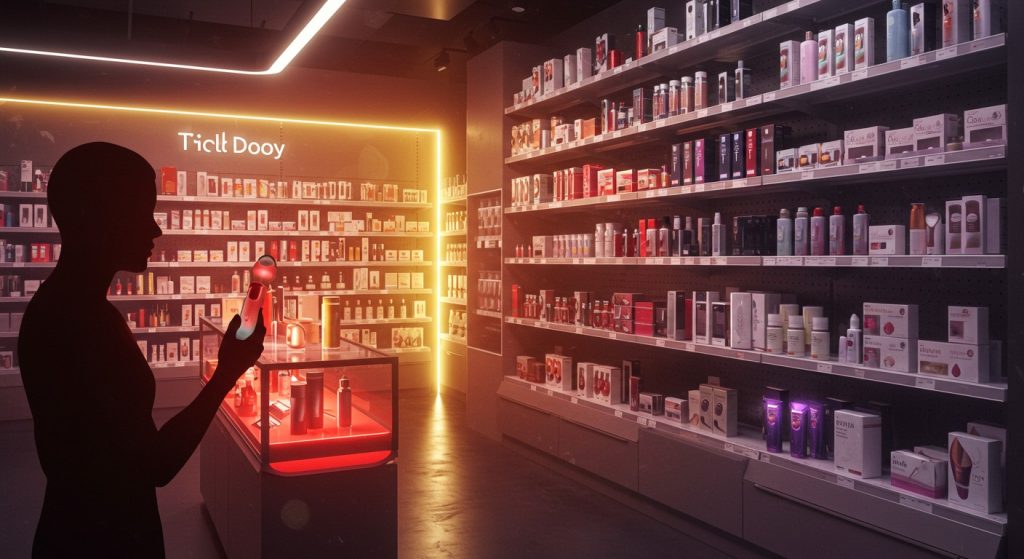Picture this: you’re strolling through Target, grabbing shampoo, when—bam!—a shiny vibrator winks at you from the personal care aisle. Ten years ago, that’d be scandalous. Now? It’s just Tuesday. Sexual wellness is mainstream, and that’s great for breaking taboos. But while big-box giants like Target and CVS stock their shelves with pleasure products, the indie adult shops that paved the way are getting screwed—and not in the fun way.
The Price of Mainstream Success
Mainstream visibility sounds like a win for the adult industry. More people buying lube at CVS means less stigma, right? Sure, but there’s a catch. The real cost isn’t just cultural—it’s economic, and it’s hitting specialty shops where it hurts most: their wallets.
Big-Box Price Wars
The issue isn’t that Target’s selling dildos. It’s that they’re selling them dirt cheap. Manufacturer’s suggested retail price (MSRP) and minimum advertised price (MAP) are supposed to keep things fair, but enforcement’s a joke. Jimmy Roark-Gruender, who runs Passions in Kansas City, puts it bluntly:
“If big-box stores sell way under MSRP, I’m done with that brand. If it’s a level playing field, I’ll keep stocking them.”
– Jimmy Roark-Gruender, Passions
Big-box chains often price products just above what small retailers pay wholesale. That’s not competition; it’s a middle finger. When a customer sees a $50 vibrator at Target for $30, they don’t just question the price—they question the whole damn store.
The Death of Special
It’s not just about dollars. It’s about value. When every Walmart carries the same bullet vibe you stock, it stops feeling exclusive. Dolores Benford of The Ladies Room in Pennsylvania nails it:
“If a customer can get it anywhere, it’s not special. Why come to me? It cheapens the product.”
– Dolores Benford, The Ladies Room
Specialty shops thrive on curated selections and expert advice. Big-box stores? They’re slinging sexual wellness like it’s toothpaste, with zero knowledge to back it up. That cheap vibe might break in a week, but the damage to indie retailers’ reputations lasts longer.
Trust on the Line
When brands let big-box stores undercut MAP, they’re not just screwing over small shops—they’re torching trust. Customers start haggling, thinking the indie store’s ripping them off. Years of building relationships, answering awkward questions, and creating safe spaces go up in smoke. Why? Because some corporate suit decided mass-market reach trumps loyalty.
It’s a vicious cycle. Customers see low prices online or at Walmart, and suddenly your boutique’s a “rip-off.” Never mind that you’re the one teaching them how to use that cock ring properly.
A Way Out?
There’s hope, but it takes guts. Kendra Mixen of Condom Sensation has a fix:
“Let big-box stores carry a limited range. Keep the high-end stuff for us. We can’t compete on price, even with six stores.”
– Kendra Mixen, Condom Sensation
Smart brands could segment their lines: basic toys for big-box, premium pleasure products for specialty shops. It’s not rocket science. It’s respect. Roark-Gruender compares it to liquor stores:
- Big-box sells cheap wine, no expertise.
- Specialty shops offer rare vintages and sommelier-level knowledge.
Same deal with adult retail. Want a basic vibe? Hit Target. Want someone to explain why silicone beats jelly rubber? Your local shop’s got you.
What’s at Stake
This isn’t just about profit margins. It’s about the soul of adult retail. Indie shops aren’t just stores—they’re sanctuaries. They’re where people go to ask about anal beads without judgment. Where they learn what lube works best for their body. Big-box can’t replicate that. But if brands keep feeding the corporate beast, those safe spaces might not survive.
Brands need to decide: chase short-term sales or protect the ecosystem that made them. Visibility’s great, but not if it kills the shops that built the industry. Loyalty isn’t just a buzzword—it’s survival.





